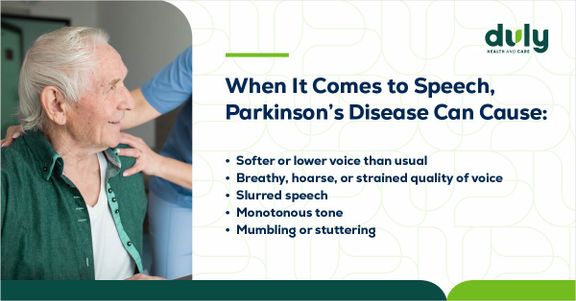Tremors, expressionless appearance, slow movements – if you ask someone to describe Parkinson’s disease, they might start with these common symptoms.
Parkinson’s disease is a neurodegenerative disorder — a condition where parts of your nervous system (especially your brain) deteriorate over time and cause progressively worse symptoms. The disease is perhaps most well-known for how it affects movement and muscle control.
However, there are many signs that aren’t quite as well-known. Knowing these signs — particularly the earlier signs — is critical for early diagnosis. While there’s no cure for Parkinson’s, there are many treatments to manage symptoms. Getting diagnosed early could mean having more treatment options or that the treatments might be more effective. It’s also been suggested that early treatment could delay the onset of some symptoms.
Here are some of the lesser-known early signs that you may have Parkinson’s disease:
1. Your handwriting is smaller than usual.
If your writing has been shrinking in size or becoming cramped, it might be due to Parkinson’s. This is called micrographia. It’s a hallmark of Parkinson’s, and it’s often among the earlier signs.
Micrographia is caused by the brain damage that leads to other motor symptoms of Parkinson’s. These symptoms, including tremors, slow movements, and rigidity, can also make the act of writing more difficult.
Once you’ve been diagnosed with Parkinson’s, some of the medications you take to help control movements may improve your writing. You might also benefit from strategies like using lined paper and practicing writing a page once a day.
2. Your speaking voice has changed.
Voice and speech problems are common in people with Parkinson’s — between 75% and 90% of people with Parkinson’s develop these problems at some point. Difficulty speaking may be one of the first signs.

Speech changes can happen with Parkinson’s because the disease causes the movements in your mouth, face, throat, and chest that you use to speak to become smaller and slower. Also, Parkinson’s symptoms like changes in thinking can affect your speech by making it difficult to find the right word or start a sentence.
If you’re having trouble speaking, you may find it helpful to work with a speech-language pathologist. Speech-language pathologists are experts at treating the voice and communication issues caused by Parkinson’s.
If you are experiencing symptoms related to Parkinson’s disease, make an appointment with a Duly Health and Care primary care provider.
Find Primary Care near you >
3. You’re losing your sense of smell.
Reduced sense of smell (hyposmia) is common with Parkinson’s. It can cause difficulty detecting certain smells or problems distinguishing smells from one another. It can also lead to changes in your sense of taste. While hyposmia is not a sign that people are often familiar with at first, it’s not uncommon for people with Parkinson’s to realize that they started losing their sense of smell years or even decades before their diagnosis.
The exact reason why Parkinson’s affects smell has been debated. Recent research has shown that it may be due to problems in the olfactory bulb, which is the part of the brain that controls smell.
There isn’t a treatment for hyposmia related to Parkinson’s, but if it’s affecting your taste and appetite, you may want to work with your provider on ensuring that you’re still meeting all your nutritional needs.
Also read: Your Parkinson’s Dynamic Duo: How Neurology & Physical Therapy work together to treat Parkinson’s Disease
4. You’ve been a bit backed up.
Constipation may be one of the more uncomfortable early signs of Parkinson’s. Like hyposmia, it can start years before developing motor symptoms.
Parkinson’s may cause changes in the nerve cells in your spinal cord and the wall of your intestines, slowing down the muscles responsible for pushing food through your digestive tract. Also, if Parkinson’s has started to affect movement, you may be less physically active than you were before — and not getting enough physical activity is a known cause of constipation.
There are several ways to prevent constipation, such as:
• Drinking six or more 8‑ounce glasses of water each day
• Eating smaller meals during the day
• Increasing the amount of fiber in your diet
• Reducing low-fiber starchy foods, like cookies or bread
• Getting more exercise
• Drinking warm beverages, particularly in the morning
Your provider might recommend occasionally using over-the-counter medications like stool softeners or laxatives, but they should not be used every day for a long period of time.
Also read: Staying Active: Hobbies and Exercises For Parkinson’s Disease
5. You can’t fall asleep.
A bout of insomnia (difficulty falling or staying asleep) is normal every now and then, and usually isn’t cause for concern. But frequent insomnia could be a sign of a medical condition like Parkinson’s.
In addition to insomnia, Parkinson’s can cause a number of other sleep problems:
• Extreme sleepiness during the day
• REM sleep behavior disorder, which involves acting out — like yelling, punching, or getting out of bed — while you’re asleep
• Interruptions in breathing when sleeping (sleep apnea)
• Discomfort in your legs while you’re lying down that only gets better with movement (restless legs syndrome?)
• Getting up often to use the bathroom
Fortunately, there are plenty of methods for improving sleep — from setting a consistent bedtime to avoiding certain foods right before bed to rethinking your sleep environment.
Having difficulty sleeping, or any of the other early signs, is hardly a guarantee that you have Parkinson’s disease. You may have a different medical condition or simply be experiencing the effects of getting older. Before jumping to conclusions, let your provider know about your symptoms. Whether they’re due to Parkinson’s disease or something else, they can help you manage symptoms and stay healthy.
Find Primary Care near you >
Health Topics:








